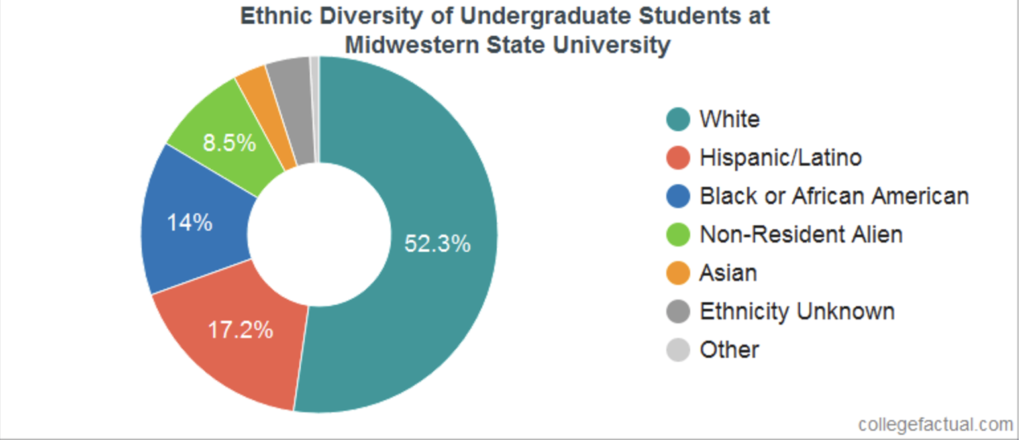
Because a college campus prides itself on diversity, out of the nine sororities on campus, five are multicultural. Although there are five sororities for girls of different ethnicities to join, these girls may feel their ethnicity can bar them from joining others — like predominantly white sororities.
To create a new sorority on campus, the process has to start with an alumni chapter. This means the alumni community must schedule a time to come together and vote on bringing in the new sorority. If it is approved by the alums, it is then passed to the undergraduate chapters, or current students, who give the final stamp of approval. Multicultural organizations were not always available to students, and many sororities like Alpha Kappa Alpha Sorority, Inc. were not brought to the campus until 1994.
“The organizations were started by members of a specific ethnicity,” Interim Director of Student Involvement Mario Ramirez said. “In today’s world and at MSU I believe that these organizations have somewhat learned to be more open about their members who can join. I’ve seen that, although there is not a large population of students in those organizations of diverse backgrounds, there is to some extent.”
Sigma Lambda Alpha refers to themselves as the ‘señoritas’ and stands by their motto, ‘Latinas by birth, señoritas by choice,’ which is shown this semester. However, Kappa Delta Chi, another Hispanic sorority, has focused on bringing in at least one member of a different ethnic background each semester.
“SLA has previously had large populations of different students from different backgrounds,” Ramirez said. “Although they were founded on that specific goal, they want to be able to help inspire and bring Latino women up, to be successful.”
Alpha Kappa Alpha had the first white member join this year since it was brought to campus in 1996. This addition, however, was not a shock to political science sophomore Ashlee Gibson.
“It’s good for the campus to be very diverse and have very diverse sororities to show that race and ethnicity doesn’t matter,” Gibson said. She encourages students to, “go out and try to join and see for yourself, don’t just judge unless you know.”
While Delta Sigma Theta Sorority, Inc. and Alpha Kappa Alpha Sorority, Inc. are considered multicultural sororities, that is actually not the technical classifications of these two organizations. According to Kharmyn Lewis, Delta Sigma Theta Sorority, Inc. social action chair, DST and AKA are historically black sororities, which is different than multicultural.
“Diversity is not a problem for those organizations who are, in fact, multicultural. Those of us who are historically black or Latinx created organizations specifically for us by us because we weren’t allowed anything else,” Lewis said. “This is the same reason historically black colleges and universities were established. That is the reason we may not seem diverse, but nationally we are.”
DST and AKA are part of the Divine Nine, which is the name for the nine historically black Greek letter organizations within the National Panhellenic Council.
“People who join Divine Nine organizations who are not black should or will grow to develop a passion and/or heightened awareness for the black community and culture of the United States,” Lewis said. “It is what we were designed for.”

Although more than half of the student population is Caucasian, Ramirez believes this does not have an effect on Greek life and how they choose new members.
“Being that we are at a predominantly white institution, a PWI, a lot of our students are going to be Caucasian or white, however they classify themselves,” Ramirez said. “I do believe that it provides a different avenue for someone to join the organizations, but I don’t necessarily think that if someone is not African American, Latino or Hispanic, that they are not going to take them.”
Educating yourself on an organization before pushing yourself to join is what Ramirez believes holds a handful of students back from joining the multicultural Greek life.
“Students might hold back to some extent, but I think that is when education comes into play. I think you should not judge anything until you get to know it and actually learn yourself,” Ramirez said. Ramirez believes when you teach yourself about the topic is when you get the truth.
“Educate yourself, I think that’s one of the big problems nowadays, not here, but anywhere in the world,” he said. “They are not educating themselves about a specific topic, it’s all they hear, all they see.”
Sasha Stuart, management senior, does not see ethnicity playing a role in select sororities and believes it has no major effect on the students due to the overall diversity of the campus.
“Most who go in Delta or AKA are going to be African American, but since it is not a primarily black campus, I do not believe it is a problem,” Stuart said. “It’s good for the campus because students can get involved and I don’t believe ethnicity plays a role.”
The university is ranked number 509 in ethnic diversity nationwide, which is above average, and grows each semester. Ramirez believes this will have an effect on the number of students who join multicultural sororities, especially with the number of Latinos rising. Ramirez hopes to see these organizations become more visible to the students and taking advantage of the first-generation students who are unaware of Greek life.
“Some of these organizations have rules and by-laws that they have to follow, but there are ways to be more visible and more prominent on campus,” Ramirez said. “Especially with the shift of students that are coming to the university now. They will have a bigger opportunity to gain more members if they open up themselves and change their process, because it might be hindering them to some extent.”
Ramirez does not see ethnicity playing a role in the selection process of sororities, but feels there should still be certain requirements that are followed.
“It’s all part of the process, you have to know the organization, see if you see yourself in that organization and the organization sees you in that organization,” Ramirez said. Ramirez does not think ethnicity is an issue, “but I think that the students do need to educate themselves on which organizations they want to join. Not just because they know someone in that organization, actually get to know the organizations, what they stand for, do your values fit into their values and vice versa, and then see if maybe you would want to be a part of that organization. I think that every student should give each other a chance, each organization a chance.”
The multicultural sororities are serviced based organizations which focus on giving back to the community through volunteering. Ramirez believes they bring a good reputation to the universities name and should be welcome to any university, specifically at MSU.
Ramirez knows Greek life may not be for everyone and encourages students to be more open to getting to know the organizations, by seeing what they’re about and how the organization will benefit them and how they can benefit the organization.
“They may not know these organizations,” Ramirez said. “But if they find their fit in these organizations, then these students become more aware and are able to help that process and continue that service to the community or to the Wichita Falls community or to the Midwestern State community. If you don’t see yourself and those check boxes aren’t there, then you probably shouldn’t join that organization. But if you do join a Greek organization or a fraternity or sorority, I think it will change their college experience for the better.”
Additional reporting by Kara McIntyre.
![]()
RELATED STORIES:
- The slow transition to becoming a Hispanic serving institution
- Baptist Student Ministry members discuss discrimination in religious organizations
- LGBTQ: avoiding the trigger point
- Students fate uncertain pending a possible end to DACA
- Priddy Scholars brings new opportunities to first year students
- Girls choose their sorority based on fit, regardless of skin tone
- Rednecks: ‘It’s just a way of life’; ‘You get to yell, ‘yee yee’ whenever
- ADA compliance still an issue on campus with older buildings
- Greeks prey to stereotypes; still a ‘necessity’
- A 21st Century look at Discrimination
- Global enrollment continues to grow thanks to university’s outreach program
- Office becomes home to new director and students
- Brother realizes fraternity not understanding, welcoming
- Senate Bill 4 changes the way officials handle immigration














